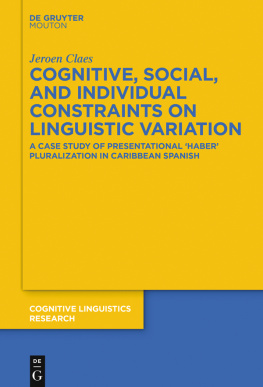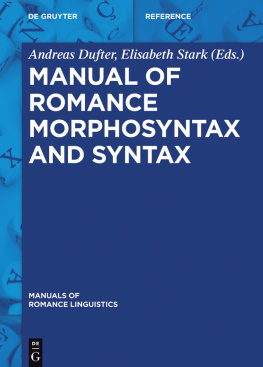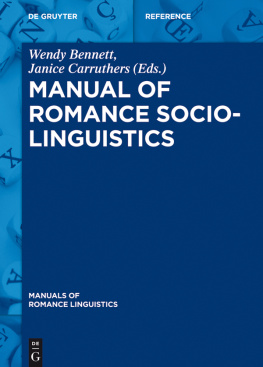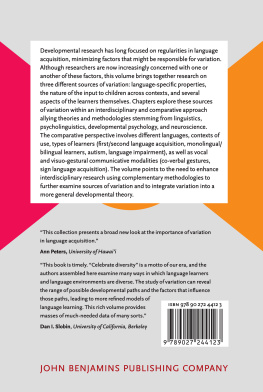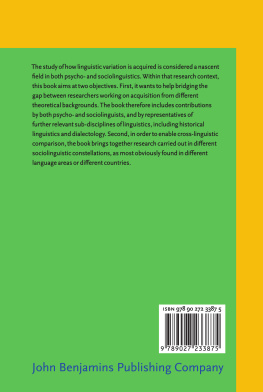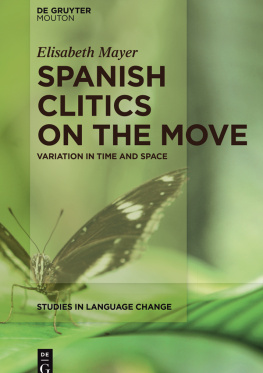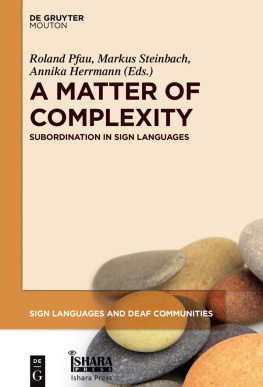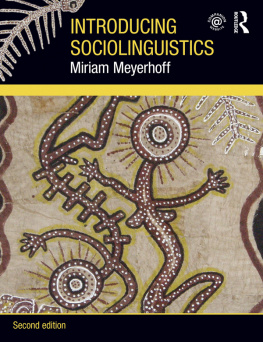Contents
Guide

Jeroen Claes
Cognitive, Social, and Individual Constraints on Linguistic Variation
Cognitive Linguistics Research

Editors
Dagmar Divjak
Dirk Geeraerts
John R. Taylor
Honorary editors
Ren Dirven
Ronald W. Langacker
Volume 60
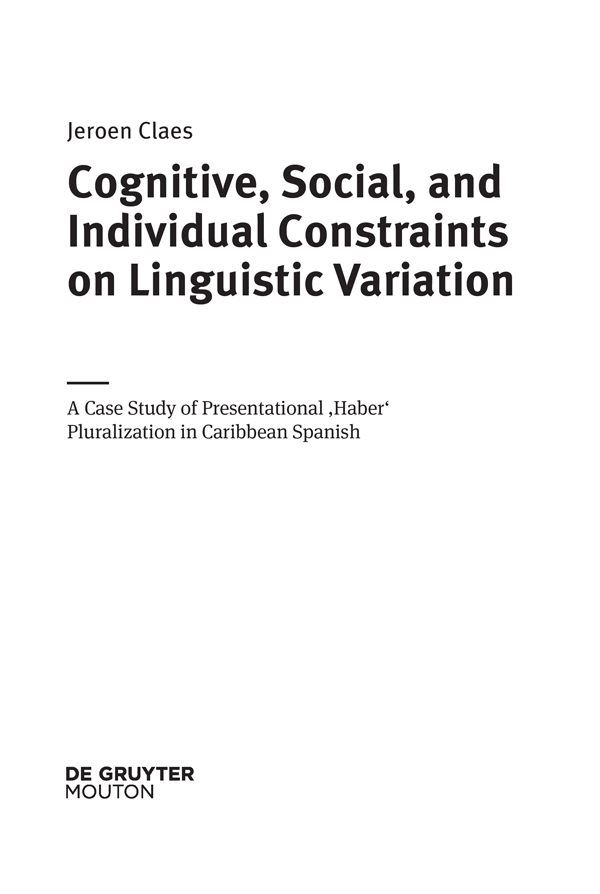
ISBN 978-3-11-052162-7
e-ISBN (PDF) 978-3-11-052415-4
e-ISBN (EPUB) 978-3-11-052170-2
ISSN 1861-4132
Library of Congress Cataloging-in-Publication Data
A CIP catalog record for this book has been applied for at the Library of Congress.
Bibliographic information published by the Deutsche Nationalbibliothek
The Deutsche Nationalbibliothek lists this publication in the Deutsche Nationalbibliografie;detailed bibliographic data are available on the Internet at http://dnb.dnb.de.
2016 Walter de Gruyter GmbH, Berlin/Boston
www.degruyter.com

For Sara
Acknowledgements
The present volume constitutes a substantially revised and expanded version of my December 2014 University of Antwerp PhD dissertation. Therefore, it is only natural to acknowledge the many contributions of my former supervisors, Frank Brisard ( University of Antwerp ) and Nicole Delbecque ( KU Leuven ). Although Frank and Nicole only took up the supervision of my PhD research around April 2013, it is hard to overestimate the value of their contributions to substantial parts of the corpus analysis upon which this volume draws. Without their helpful criticism, the analyses of would have been less rigorous and the conclusions drawn from them less solid.
In addition, many people have contributed to the intensive fieldwork upon which this investigation draws. First and foremost, I am indebted with the 72 participants of this study, who agreed to lend their time, voices, and experiences to the project. I should also thank Luis A. Ortiz-Lpez ( Universidad de Puerto Rico, Recinto de Ro Piedras ) and his research assistant Nadja Fuster, who have done a great job looking for participants in San Juan. Sunny Cabrera-Salcedo, the Chair of the Graduate Linguistics Program at the Universidad de Puerto Rico, Recinto de Ro Piedras , was kind enough to write a letter of recommendation that opened many doors. Her help in locating participants was also appreciated. Boris Carrasquillo, Jos-Alberto Santiago, and Naiska Guzmn drove me around San Juan to interview friends, acquaintances, or family of theirs. The Casas Culturales of the Municipality of San Juan in the boroughs of Tras Talleres and Chcharo were also a great help, as were the homeless shelter/rehabilitation center Fondita de Jess and the elderly residence Sagrado Corazn .
In Santo Domingo, I could count on the support of Lilia Ramos ( Pontfica Universidad Catlica Madre y Maestra , Recinto Toms de Acquino) . The assistance of Ginia Montes de Oca ( UNIBE Universidad Iberomericana ) was also of great value. Without their help, it would have been a lot more difficult to fill in the quota for young university-educated participants.
While preparing the Havana fieldwork, I could enjoy the support of Sandra Valds, who guided me through the process of applying for an academic visa. Through her friend Maia Barreda, Sandra also introduced me to Alejandro Snchez ( Universidad de La Habana, Facultad de Letras ). It was a relief to hear upon my arrival in Havana that Alejandro already had a list of potential participants in mind. During my stay, he continuously kept looking for more. I am also indebted with the staff of the Casa de Abuelos Eterna Juventud in the Centro Habana borough Cayo Hueso. Thanks to their collaboration I was able to interview older participants at a very steady pace.
The final revision of the manuscript was performed during the last months of a one-year postdoctoral position at KU Leuven, Quantitative Lexicology and Variational Linguistics . I wish to thank my colleagues at KU Leuven for interesting discussions that have contributed to refining the ideas that are presented in this book. For the same reason, many thanks also go to Daniel Ezra Johnson. In addition, the suggestions of Paul ONeill ( University of Sheffield ), who was commissioned by the Cognitive Linguistics Research series to the review the manuscript, helped me structure the book more adequately. The remarks of the series editors Dagmar S. Divjak and Dirk Geeraerts also contributed to this. Julie Miess and Antonia Schrder at De Gruyter answered my every query with patience, speed, and precision.
Last, but not certainly not least, I would like to thank my girlfriend Sara Lauwers, my parents Herman Bastiaens, Rudy Claes, and Veronique De Wit, my grandparents Jenny Claessens, Leon De Wit, Louis Claes, and Rita Patteet, my older brother Bart Claes, my sister-in-law Ellen Slachmuylders, my sister-in-law Kathleen Lauwers, my in-laws Ludo Lauwers and Lydia Van Espen, and my friends for their encouragement and support. My niece and godchild Olivia Claes, who was born around the time I completed the bulk of this investigation, also deserves a special mention. Although my family and friends do not always understand exactly what my work is about, they have always been there for me to help me cope with the, at times, difficult circumstances in which I have found myself doing research. Without their continuous encouragement and loving understanding, I would most certainly not have completed this project.
List of figures
List of tables
Abbreviations and other conventions
| < > | Construction schema |
| [ ] | Literal translation |
| ACC | Accusative case |
| AdvP | Adverbial phrase |
| AICc | Second-Order Akaike Information Criterion |
| Boldface | Profiled portions of event frames |
| LH01H22/LH33 | The codes at the end of the examples identify the cases in the corpus: LH=Havana (SD=Santo Domingo, SJ=San Juan); 01= informant number 1; H=male informant (M=female); 2=55+ years of age (1=20-35 years of age); 2=university graduate (1=less than university). The code behind the backslash is the identifier of the specific example. |
| NOM | Nominative case |
| Obj | Direct object |
| Obj1 | Indirect object of a three-argument construction |
| Obj2 | Direct object of a three-argument construction |
| PL | Agreeing presentational haber |
| RAE and ASALE (2009) | Real Academia Espaola and Asociacin de Academias de la Lengua Espaola (2009) |
| SG | Non-agreeing presentational haber |
| Subj | Subject |
1Introduction
In recent years, the usage-based approach to language (e.g., Bybee 2010; Langacker 1990: Chap. 10) has implied that cognitive linguists have increasingly moved away from introspective methods, in favor of corpus investigation and experimentation. Because these data sources inevitably confront the researcher with social, regional, and stylistic variability (e.g., Geeraerts 2005; Geeraerts and Kristiansen 2015), this methodological shift has spiked interest in language-internal variation and its sociocultural covariates. In this context, Cognitive Sociolinguistics emerged, which proposes that a complete understanding of language can only be reached when the social and cultural factors shaping usage events are considered together with the cognitive ones (Geeraerts and Kristiansen 2015:366-371; Ptz, Robinson, and Reif 2012).

